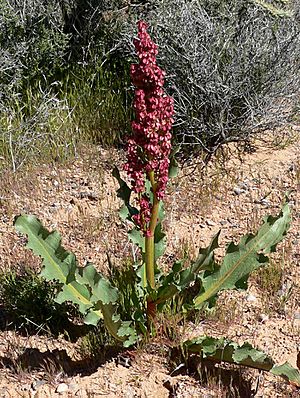Canaigre facts for kids
Quick facts for kids Canaigre |
|
|---|---|
 |
|
| Conservation status | |
| Scientific classification |
|
| Kingdom: | Plantae |
| Clade: | Tracheophytes |
| Clade: | Angiosperms |
| Clade: | Eudicots |
| Order: | Caryophyllales |
| Family: | Polygonaceae |
| Genus: | Rumex |
| Species: |
R. hymenosepalus
|
| Binomial name | |
| Rumex hymenosepalus Torr.
|
|
| Script error: The function "autoWithCaption" does not exist. | |
| Synonyms | |
|
Rumex arizonicus |
|
Script error: No such module "Check for conflicting parameters".
Rumex hymenosepalus, often called canaigre or wild rhubarb, is a plant that lives for many years. It grows naturally in the deserts of the southwestern United States and northern Mexico. This plant is a common food source for the young larvae of the ruddy copper butterfly.
Contents
Amazing Uses of Canaigre
Canaigre has been grown in the southwestern United States for a long time. People use its roots for different purposes.
Tanning Leather with Canaigre
The roots of the canaigre plant are a great source of something called tannin. Tannin is a special substance used to make leather. This process is called tanning. It helps turn animal skins into durable leather.
Natural Dye from Canaigre
Besides tanning, canaigre roots also produce a warm, medium brown dye. This natural dye can be used to color fabrics or other materials.
Eating Canaigre: A Wild Rhubarb
The young leaves and leaf stalks of the canaigre plant are safe to eat. Older leaf stalks can be cooked, much like rhubarb. This is because canaigre belongs to the same plant family as rhubarb.
Discovering Canaigre: Its Scientific Name
The plant Rumex hymenosepalus was first officially described in 1859. An American botanist named John Torrey gave it its scientific name. He wrote about it in a report about the United States and Mexican border.
Other Names for Canaigre
Sometimes, plants can have different scientific names over time. These are called synonyms. Some other names that have been used for canaigre include Rumex arizonicus and Rumex salinus.
See also
 In Spanish: Canegra para niños
In Spanish: Canegra para niños
 | Georgia Louise Harris Brown |
 | Julian Abele |
 | Norma Merrick Sklarek |
 | William Sidney Pittman |


